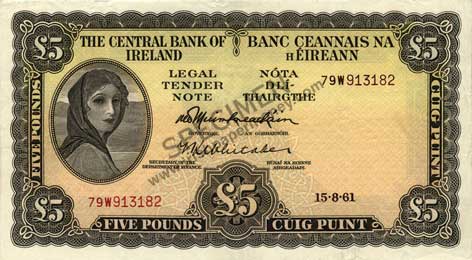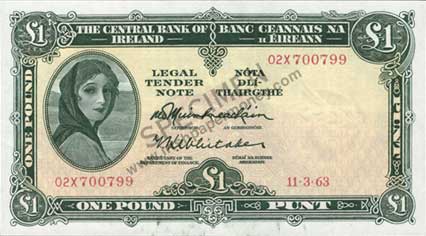

Throughout the series of Irish banknote issues there were several varieties and variations in design, and also slightly anomalous issues which do not warrant being classified as different Types. Some of these variations were transitory, appearing for a while and then disappearing again. Other variations remained as permanent changes.
These variations were both accidental and introduced by design. What makes a variety or variation important is whether or not a banknote collector decides to collect the note as a separate entity along with the non-variant note.
A brief summary of the variations follows, with linked pages giving greater detail and illustrations.
There are several anomalous variations in the Series A Lavery notes.
First noted in literature around 1974, the mulberry variety notes have a random inking flaw producing variably dark serial numbers in place of normally bright red numbers on some notes. In some cases the ink variation appears to be almost black. The darker the ink of the mulberry, the more sought-after the note. They are about as scarce as star replacement notes, with the ‘black’ ones being quite rare. They are regarded as a major variety amongst Irish notes.
Mulberry variety has been seen on 1959 and 1960 £1 notes of Type 9 (McElligott, Whitaker signature combination), and all red numbered denominations of Type 11 (Muimhneacháin, Whitaker signature combination).
In May 1974 a £1 note dated 11.3.63 was issued into circulation by the Central Bank of Ireland during a shortage of £1 notes. Mulberry serial numbers have also been seen on many of these notes. Speculation is that they were a special printing of some kind, most likely column sort notes or star replacement notes which were not then used.
We know that they were printed, dated and numbered with the other Type 11 notes, as the mulberry variation occurs on them with a similar frequency to the other mulberry £1 notes of this era.
Dark Emerald Green £1 note. All £1 notes dated 31.12.58 are unusually dark in colour.
Design 2 £1 notes: 2.9.59 and 18.5.60. Different plates were used to print £1 notes of these dates.
These dates are all Type 9 notes with the McElligott, Whitaker signature combination.
Certain dates of war code notes appear with either of two war codes on them, the normal expected code for the date, or the previously used war code.
The displaced code variety occurs on three dates for the 10 Shilling Notes, and four dates of the £1 notes on Type 4 Currency Commission war code notes and Type 5 Central Bank war code notes.
Special Sections and Articles
The Transition of Irish Currency, Irish banknotes 1918–1928
The Partition of Irish Currency, Irish banknotes 1928–1930
Banknote Design Evolution 1824 to 1916
Irish Three Pound Notes
Contemporary Forgeries of Early Irish Banknotes, ca1800-1930
Limerick Soviet Notes
Irish World War 2 Banknote Issues
Low Number Irish Banknotes
Irish Joint Stock Banks of Note Issue from 1783
Irish Legal Tender Note Specimens
Ploughman Scan Survey (PSS)
1 Pound Ploughman
5 Pounds Ploughman
10 Pounds Ploughman
20 Pounds Ploughman
50 Pounds Ploughman
100 Pounds Ploughman
Irish Ten Shilling Notes
1 Pound Note Lady Lavery
5 Pounds Lady Lavery
10 Pounds Lady Lavery
20 Pounds Lady Lavery
50 Pounds Lady Lavery
100 Pounds Lady Lavery
1 Pound Note, Queen Medb
5 Pound Note, John Scotus Eriugena
10 Pound Note, Jonathan Swift
20 Pound Note, W. B. Yeats
50 Pound Note, Turlough O'Carolan
100 Pound Note, Grace O'Malley
5 Pound Note, Sister Catherine McAuley
10 Pound Note, James Joyce
20 Pound Note, Daniel O'Connell
50 Pound Note, Douglas Hyde
100 Pound Note, Charles Stewart Parnell